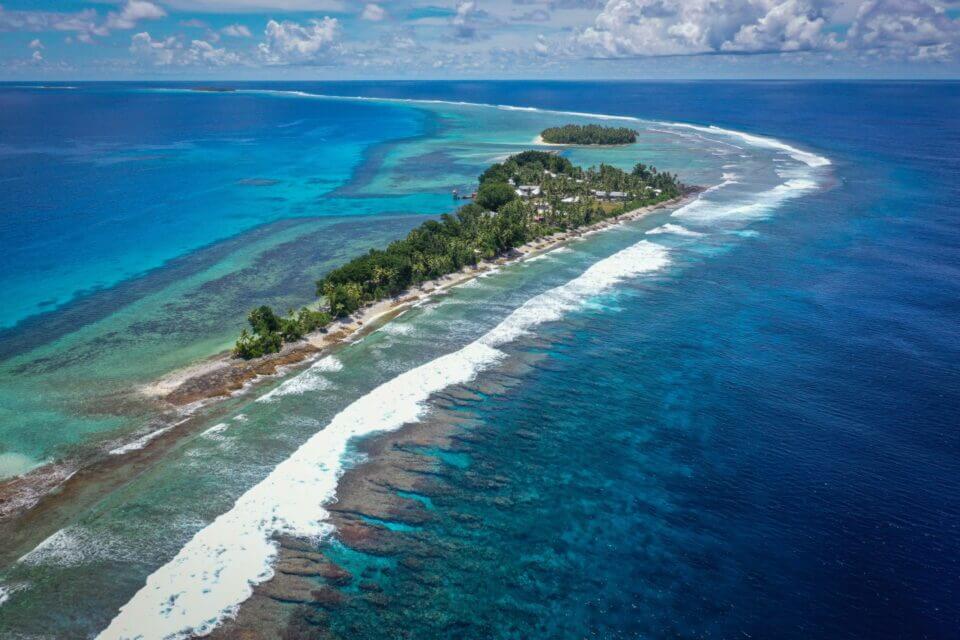
“What is new, in this case, is that the people of Tuvalu are hoping their future metaverse-based civilization will continue to function as a state and will be recognized internationally as a proper nation.”
By the year 3000, the tiny island nation of Tuvalu will likely be underwater. Even today, the capital district is 40% underwater at high tide. But Tuvalu is not planning to be wiped off the map. Defying its fate through technology, the island nation is rebuilding virtually. It is relocating to the metaverse.
The metaverse project is partly about preserving Tuvalu’s culture. It is fascinating that the metaverse is being put to this use, but the spirit of the project is not entirely new. People have always used the media tools of their day to preserve culture for future generations. What is new, in this case, is that the people of Tuvalu are hoping their future metaverse-based civilization will continue to function as a state and will be recognized internationally as a proper nation.
Simon Kofe, Tuvalu’s Foreign Minister, says that seven governments will continue viewing Tuvalu as a nation. But will other governments follow suit? Should they? Legal authorities are taking steps to determine how to handle human rights and nationality in the context of climate change. For example, the International Law Association established the Committee on International Law and Sea Level Rise in 2012. But, as Reuters notes, the prospect of a nation maintaining legal status in the metaverse is a new area of international law.
In philosophy, simple questions like “What is art?” have never been fully resolved. They cannot be. For a concept like “art,” it is impossible to get everyone to agree to a single definition. Yet, in the real world, the consequences can be significant. For example, if one is shipping a large object internationally, the taxes and fees may be different depending on whether the object qualifies as “art.” So, there must be a definition that is reasonably accommodating, but which cannot be easily exploited.
This is the nature of Tuvalu’s problem. The subjective definition of “nation” carries with it highly practical implications. If Tuvalu is allowed to exist as a metaverse-based nation, then it will be able to maintain control of its maritime boundaries, collect taxes, issue passports, maintain a military, etc. At the same time, this would open the door for all metaverse communities to seek legal status as proper nations.
Virtual reality (VR) is a type of artistic medium. A space created in VR is not incomparable to other visual art, such as paintings. In this context, Tuvalu creating a metaverse is the modern equivalent of the residents of Atlantis creating paintings of their island before it sank. If people showed up today with paintings of Atlantis (and a paper trail of Atlantis citizenship), would we consider them members of a proper nation? Certainly not.
Proponents of a metaverse nation would argue that physical paintings are not analogous to virtual reality. Unlike a painting, VR is highly realistic, immersive (one is inside the painting), interactive (one can communicate with others in real time, as if they were both really there), and it can facilitate commerce and bestow (virtual) property rights.
These distinctions are important. Many have argued that “real life” is essentially a video game already. For that matter, if the simulation hypothesis is true, then we are literally in a video game. Yet no one would contend that life is a static painting.
This still leaves the concern that metaverse-based Tuvalu would open the door to endless metaverse creators seeking nationhood. People have been creating virtual cities for decades, going back to the 1980s with SimCity. Now, with immersive sims proliferating, much is being written about metaverse legal rights and even citizenship. What are the implications for “real” citizenship if the concept is granted to purely virtual lands?
Notably, Tuvalu is not the only physical place merging with the metaverse. Several global cities, including Dubai, Singapore, Seoul, and Shanghai are already building metaverses. In 2014, Estonia launched an e-Residency program to “to fulfill its ambition of creating a borderless digital society for global citizens.” Other countries have considered going in this direction.
It is possible that the lines between the real world and the digital world may ultimately blur so thoroughly that it does not matter whether a country began as a physical place or not. If one has a business in virtual Seoul, meets friends there, owns property and pays taxes there, and has citizenship there, does it really matter whether “there” is a place he can actually visit in the physical world? Maybe one lives in a socially and economically isolated community and is scared of flying. Meanwhile, he has created a bustling life for himself in virtual Seoul, and every now and then he likes to take a vacation to the sunny beaches of Tuvalu. The fact that one’s favorite vacation spot is under water may never even cross his mind.
Peter Clarke is a freelance journalist in San Francisco. He can be found on Twitter @HeyPeterClarke
Read More: news.google.com









 Bitcoin
Bitcoin  Ethereum
Ethereum  XRP
XRP  Tether
Tether  Solana
Solana  Dogecoin
Dogecoin  USDC
USDC  Cardano
Cardano  Lido Staked Ether
Lido Staked Ether  TRON
TRON  Avalanche
Avalanche  Sui
Sui  Wrapped stETH
Wrapped stETH  Chainlink
Chainlink  Toncoin
Toncoin  Shiba Inu
Shiba Inu  Stellar
Stellar  Wrapped Bitcoin
Wrapped Bitcoin  Hedera
Hedera  Polkadot
Polkadot  WETH
WETH  Bitcoin Cash
Bitcoin Cash  Uniswap
Uniswap  Pepe
Pepe  Hyperliquid
Hyperliquid  Litecoin
Litecoin  LEO Token
LEO Token  Wrapped eETH
Wrapped eETH  NEAR Protocol
NEAR Protocol  Internet Computer
Internet Computer  Ethena USDe
Ethena USDe  USDS
USDS  Aptos
Aptos  Aave
Aave  Render
Render  Mantle
Mantle  Bittensor
Bittensor  POL (ex-MATIC)
POL (ex-MATIC)  Cronos
Cronos  Ethereum Classic
Ethereum Classic  Artificial Superintelligence Alliance
Artificial Superintelligence Alliance  Virtuals Protocol
Virtuals Protocol  WhiteBIT Coin
WhiteBIT Coin  Arbitrum
Arbitrum  MANTRA
MANTRA  Monero
Monero  Tokenize Xchange
Tokenize Xchange